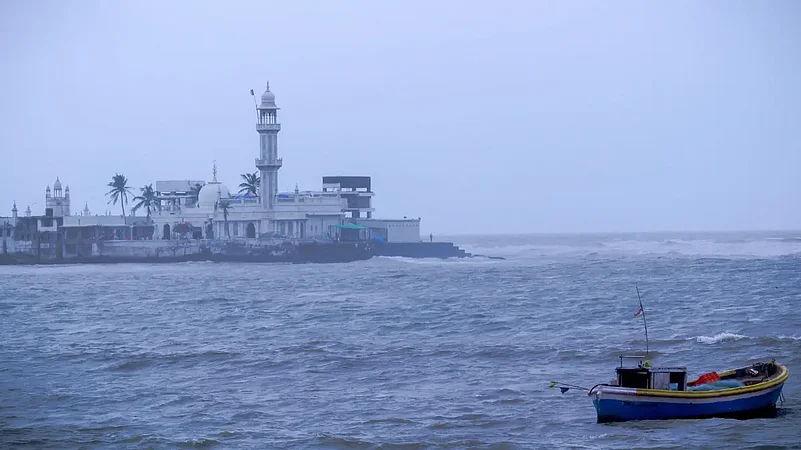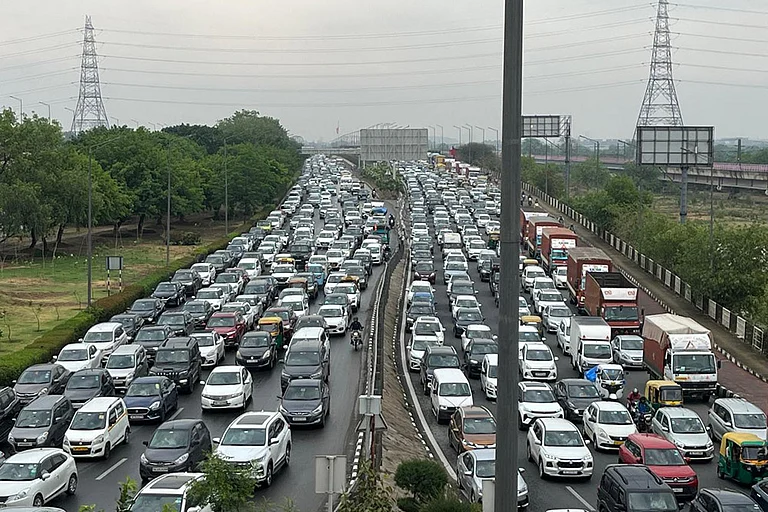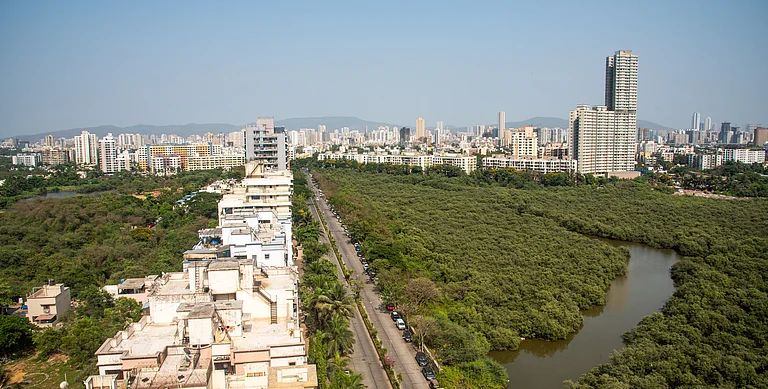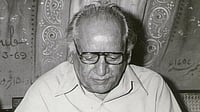After relocating to Mumbai in June 2018, I had to put up at a guest house off Nariman Point for a few months, before shifting to a residence in Malabar Hills at the end of September. I quit smoking on 4th December 2018. During this five months period from June to the end of November, I would stop on my way back from the office for my daily puff at a cigarette shop near Jaslok Hospital on Peddar Road.
It was not a shop, nor even a shack, but a seller on the footpath between a milk booth and a pav-bhaji stall. His well-worn wooden tray had an assortment of cigarette brands including Classic, my favourite; and sachets of various tobacco products.
The seller was a sturdy man in his late fifties, tall and well built. He wore salt and pepper stubble and a lush moustache. I would buy a cigarette, smoke it, and leave after popping in a mint or toffee to smother the smell.
We never exchanged a word except on the first day when I indicated my brand. After that, the moment he saw me he would take out one stick of Classic and would hand it over to me, with a little bit of theatre, holding his right-hand elbow with his left hand in the typical Purabia fashion. It might have been in deference to my car, or my suits and jackets or my age, whatever.
The man was laconic, not speaking much except when talking to his family members on phone in his gruff voice, usually giving instructions with regard to the management of his lands back home.
From his accent (of Bhojpuri) I could gather that he was from eastern UP, and from his conversations he lived in Mumbai alone, somewhere in the Tardeo area, which is not far off. I could also know that his name was Ram-aashray Singh since one of his known customers once called him by that name.
He seemed to be a proud man in his conduct, not a hint of dispiritedness about him, rather an air of assurance. One of those economic migrants whose forefathers would have been men of means and repute, I thought. He also seemed to be doing well since whenever I forgot to carry change, he was ready to break high denomination notes without hesitation, and I always saw his wallet full of currency.
Every now and then, I saw a lady sitting near him on a bamboo seat, chatting incessantly with him, without being too conspicuous. Initially, I thought her to be his wife, but gradually it seemed unlikely since their conversations were about problems which were different from each other.
They spoke in Hindi, the lady with a heavy Munbaia accent, indicating her possible local roots.
The man mostly talked about his debts and employment of his sons; the lady about medical issues, her rental receivables and small savings. They talked intimately, the way we share our woes with close friends in order to lessen our stress.
One day, the lady was talking to some delivery boy and mentioned her address as Cursetji Shuklaji Street near Foras Road. The name rang a bell. Wasn't it once the street known as Safed Gulli, in Kamathipura, denoting the European and Japanese prostitutes operating out of the locality during British times?
I had not been to the dense quarters of South Central Mumbai but knew that the low-lying, marshy areas were reclaimed from the sea. William Hornby, the Governor of Bombay in the late 18th century, launched upon the ambitious project to fuse together the island of Bombay with Worli, Mazgaon and Parel. The vallard named after him plugged the great breach near Mahalaxmi and the Bellasis causeway joined Malabar with Mazgaon.
The huge sprawl emerging out of the landfills - between Byculla and Grant Road, was thickly settled, mostly by labourers (Kamathis) working in the docks in Mazgaon and later in the cotton mills in Parel. Hence the name Kamathipura, a locality which in time earned the disrepute of being the largest red light area in the world, and spawned many stories and legends and film scripts.
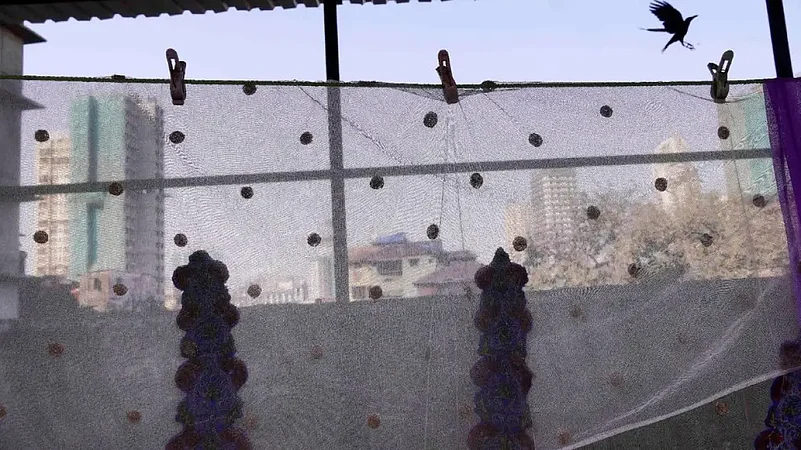
As for Foras Road, it is believed that the reclaimed, salt-batty land in the entire area from Sion, Mahim, Worli down to Grant Road was known as foras land after a special land tenure which had nominal/fixed rent. The name Foras Road is a remnant of that arrangement.
Anyways, the mention of Cursetji Street made me turn my attention to the lady - she must have been in her early forties, past her prime apparently, but careful in her upkeep and prim in manners. She was dusky, a bit plumpish as well, but what stood out in her persona was a pair of sparkling, bright eyes.
Was she a hustler? I wondered. Even if she were, she was obviously not in active service any longer, otherwise, she wouldn't be able to spend her evenings away from her workstation. Was she a paramour of the cigarette seller? It looked possible, two lonely souls finding solace in each other's company while eking out their lives in a heartless metropolis.
Even after I stopped smoking, I would occasionally glance towards that spot while passing by, to check if the cigarette seller's custom was flourishing and whether the lady was still hanging about him. I was not disappointed on either count.
And then came the lockdown. All shops were closed, and even footpath vendors were driven off the roads. Peddar Road was no exception, and the cigarette seller was nowhere to be seen.
There has been a steady exodus of the migrant population from Mumbai for over a month, and I thought the enterprising man must have managed to relocate by now.
But suddenly, one Friday, when I stopped at a milk booth near Haji Ali, I spotted the man, as also the lady, face masks lowered, buying bread from the same booth. I felt a rush of emotions in me and noticed that their faces also brightened upon seeing me. Both apparently remembered me even after a gap of one and a half years.
"How are you man, you still in Mumbai", I asked, my first full sentence to him ever.
"Yes Sir. I have stayed back. Waiting for things to improve".
"Namaste Sir", said the lady. I folded my hands.
" But things must be very bad, how are you managing rent and all? Why don't you go back?"
" Managing somehow Sir. What is there to gain in return? My sons are already facing tough conditions. Things will be normal in a month or two, no? "
"Of course, they will be."
"I have given him a room at my place for the time being Sir", the lady added, "And once this bandi is over, he can even think of some other business."
"Well of course."
So he has moved in with her after all, I thought, my hunch that they were lovers was true. And they seemed to have suddenly opened up to me as if I were already privy to their private affairs. Or maybe they knew all along that I had been eavesdropping on their conversations. I felt ashamed.
"Do you need any help?"
"No, no Sir. No problem. We will manage", the strong denial came from both.
"But what are you doing here in the lockdown, you stay at some distance, don't you?," I asked.
"Sir, visiting Hazi Ali has been Fatima's daily routine for long. Now it is closed, but she wants to bow her head to it, even from a distance. We manage to walk here every evening, she knows many of the policemen so that's not a problem."
"So she was Fatima, hmmm !! If she was in the profession I think she was, she would obviously know the cops," I thought.
But I was grateful to her for giving shelter to my migrant. I wished the lockdown would be lifted as early as possible so that people of fortitude like Ram-aashray and Fatima might pick up the threads of their lives.
(Sanjay Kumar is a writer, based in Patna, Bihar)






